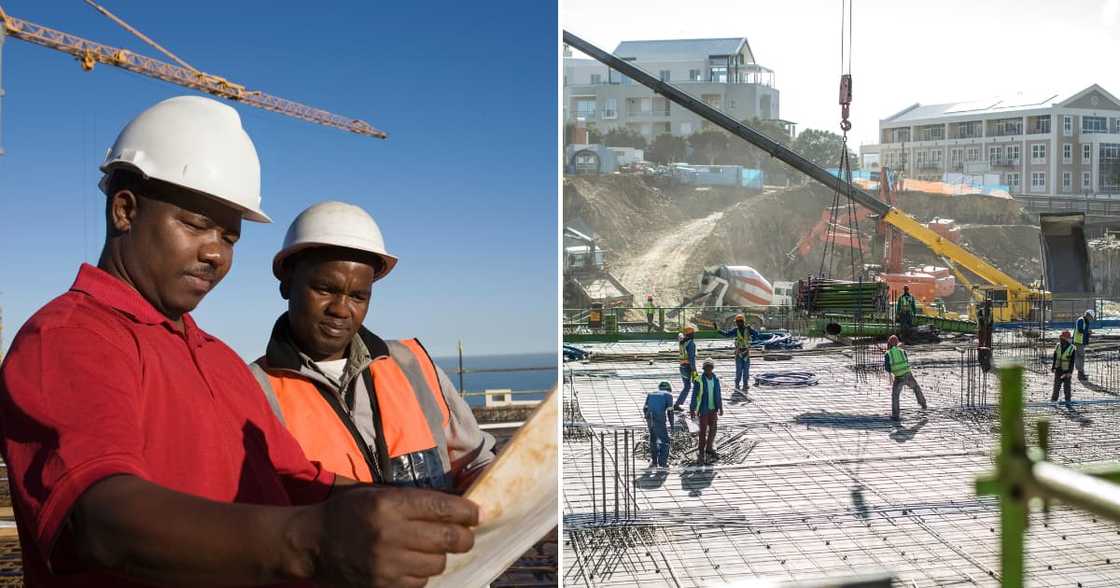Construction Mafias Explained: How They Operate, How Dangerous They Are and Other Questions Answered
Construction mafias have been a terrible nightmare for construction companies who just want to finish their projects. These syndicates can go from demanding a 30% cut from companies to forcing businesses to pay a protection fee.

Source: Getty Images
Briefly News looks at the construction mafia phenomenon taking over the country and the impact this has on businesses, service delivery and the country.
What are construction mafias?
Construction mafias can be traced back to 2014. Various groups described as "local business forums" discovered that they could force construction companies to pay a percentage of the money they received for their particular project.
By definition, construction mafias are a group of "business forums" that invade construction sites and demand payment from the companies working on those sites.
PAY ATTENTION: Briefly News is now on YouTube! Check out our interviews on Briefly TV Life now!
These construction mafias essentially extort money from established construction companies that the government has hired through tender processes. Extortion also happens in private developments.
According to a report by the Global Initiative Against Transnational Organized Crime (GI-TOC), the origins of construction mafias can be traced back to KwaZulu-Natal, particularly in Umlazi and KwaMashu townships.
The GI-TOC explains that the Delangokubona Business Forum from Umlazi and the KwaMashu Youth in Action Movement both operated under the banner of "radical economic transformation".
The groups targeted projects in their respective townships and demanded that these companies hire members from their forum for jobs on the construction sites and give them a 30% cut of the project's worth. The forums sometimes extorted "protection money" from these companies.
The GI-TOC report author Jenni Irish-Qhobosheane explained that after the forums successfully extorted projects in their townships, the groups joined forces and formed the Federation for Radical Economic Transformation (FFRET).
In 2016, the forum expanded with several "local business forums" linked to the FFRET and began extorting money from construction companies in KwaZulu-Natal. By 2018, splinter construction mafia groups had formed nationwide, changing how construction companies operated.
How dangerous are construction mafias?
In the early days of construction mafias, members of these "local business forums" were heavily armed. According to the Daily Maverick, at one construction site, the company owner was handed an AK-47 bullet by a group of men who told him the bullet cost R17.
The heavily armed men proceeded to threaten the owner by saying that his life was worth R17 if he refused to give in to their demands. Construction mafias are known to be violent, especially when owners refuse to comply with these "local business forums".
In some cases, members of these groups damage infrastructure and make it difficult for the project to continue until owners give in to their demands. According to the Daily Maverick, businesses tried to fight against extortion from construction mafias.
How have construction companies in South Africa tried to fight against extortion?
Between 2016 and 2019, construction companies filed more than 51 court interdicts against extortion groups. However, these interdicts did little to stop the construction mafias from threatening and extorting these businesses.
Chairperson of the KwaZulu-Natal Business Chambers Council, Dominic Collett, explained that construction companies and developers ended up giving in to the demands of these business forums. Collett added that by doing so, these companies inadvertently legitimised these business forums.
"Negotiating with [the business forums] means recognising them, which means legitimising them. This is like slowly boiling a frog.
"Eventually, it will explode and businesses will disappear because of it. Businesses can’t afford to part with 30%, especially if they aren’t getting any value," Collett stated.
Businesses conceding to extortion groups means that there has been less violence on construction sites since 2019. In some cases, companies budget for the business forums' 30% fee to avoid violence, which allows the projects to continue.
Some companies that ended up negotiating with the FFRET found that the agreement worked well for a while until other groups not linked to FFRET started making demands.
How do construction mafias impact service delivery?
In the City of Cape Town, construction mafias are targeting companies contracted by the city or the Western Cape provincial government. According to eNCA, some construction companies are hired to build houses for residents.
Residents in the city have been waiting for these houses for decades, but construction has been delayed or halted because of construction mafias.
Some construction companies even decided to pack up and abandon the site because, in some cases, workers were shot at. The same can be said about other government projects that involve building the necessary infrastructure for residents.
A popular construction company, Calgro M3, stated last year that they would no longer do business in KwaZulu-Natal due to construction mafias, according to Newszroom Afrika.
Following the 2021 July unrest in KwaZulu-Natal and Gauteng, where businesses were looted and damaged, construction mafias targeted businesses that wanted to rebuild.
The criminal groups demanded money from businesses before they could open shop again. According to the GI-TOC report, in 2019, about 183 infrastructure and construction projects worth more than R63 billion were impacted by construction mafias.
How is government responding to construction mafias?
So far, government and the police have not been able to get a grip on the rising trend of construction mafias.
Government is trying to address the issue and has now drafted policies and legislation to tackle extortion syndicates in the construction sector. According to News24, this includes the Critical Infrastructure Protection Act (CIPA), the National Infrastructure Plan (NIP) and the Critical Infrastructure Programme.
The CIPA, for example, will repeal the National Key Points Act that protects all national key points infrastructure. CIPA aims to secure sites, projects and developments on an ongoing basis.
These sites will be assessed in the interest of the protection of economic stability, public safety and the preservation of essential public services.
While the CIPA is not in effect yet, business owners of critical infrastructure, including private developments, may apply for support to secure or recover their sites if extortion groups have taken them over.
The protection or the recovery costs of the critical infrastructure will fall on the owners and not the state.
In the City of Cape Town, Mayor Geordin Hill-Lewis has suggested hiring security companies to sites to stop construction mafias, stating that this approach could cost the city millions, reports eNCA.
Hill-Lewis warned that the country is at risk of becoming a mafia state if nothing is done to stop construction mafias. He added that businesses would not be able to run without paying a protection fee.
How will the repo rate increase impact ordinary South Africans? How it works and 4 other questions answered
In other news, Briefly News previously reported that the South African Reserve Bank set alarm bells ringing across the country when it announced that the repo rate would be increased by 25 basis points on 27 January 2023.
Understandably, ordinary South Africans are worried about how the rate hike will hurt their pockets and how they can come out at the other end of the increase with their finances intact.
Briefly News reached out to independent economic analyst Professor Bonke Dumisa to get answers to the nation's most pressing questions.
PAY ATTENTION: Follow Briefly News on Twitter and never miss the hottest topics! Find us at @brieflyza!
Source: Briefly News

